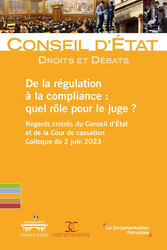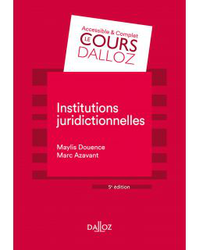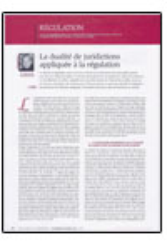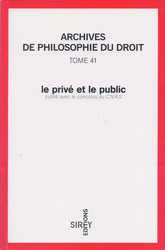April 4, 2024
Publications

🌐follow Marie-Anne Frison-Roche on LinkedIn
🌐subscribe to the Newsletter MAFR Regulation, Compliance, Law
____
► Full Reference: M.-A. Frison-Roche, "Le rôle du juge dans le déploiement du droit de la régulation par le droit de la compliance" ("Synthesis: The role of the Judge in the deployment of Regulatory Law through Compliance Law"), Synthesis in Conseil d'État (French Council of State) and Cour de cassation (French Court of cassation), De la régulation à la compliance : quel rôle pour le juge ? Regards croisés du Conseil d'Etat et de la Cour de cassation - Colloque du 2 juin 2023, La Documentation française, "Droits et Débats" Serie, 2024, pp. 173-182
____
____
🚧read the bilingual Working Paper which is the basis of this article, with additional developments, technical references and hyperlinks
____
► Presentation of this concluding article: It is remarkable to note the unity of conception and practice between professionals who tend to work in administrative jurisdictions and professionals who tend to work in judicial jurisdictions: they all note, in similar terms, an essential movement: what Regulatory Law is, how it has been transformed into Compliance Law, and how in one and even more so in the other the Judge is at the centre of it.
Judges, as well as Regulators and European officials, explain this and use different examples to illustrate the far-reaching changes it brings to the Law and to the companies responsible for increasing the systemic effectiveness of the rules through the practice and dissemination of a Culture of Compliance.
The role of the judge participating in this Ex Ante transformation is renewed, whether he/she is a judge of Public Law or a judge of Private Law, in a greater unity of the legal system.
____
► English Summary of this article: The tug-of-war between 'Compliance' and 'conformity', which is exhausting us, obscures what is essential, i.e. the great novelty of a branch of law that assumes a humanist vision expressing the ambition to shape the future so that it is not catastrophic (preventing systems from collapsing), or even better (protecting human beings in these systems).
The article begins by describing the emergence of Compliance Law, as an extension of Regulatory Law and going beyond it. This new branch of law takes account of our new world, brings its benefits and seeks to counter these systemic dangers so that human beings could be their beneficiaries and are not crushed by them. This branch of Ex Ante Law is therefore political, often supported by public Authorities, such as Regulatory Authorities, but today it goes beyond sectors, as shown by its cutting edge, the Obligation of Vigilance.
The "Monumental Goals" in which Compliance Law is normatively anchored imply a teleological interpretation, leading to an "empowerment" of the crucial operators, not only States but also companies, responsible for the effectiveness of the many new Compliance Tools.
The article goes on to show that Judges are increasingly central to Compliance Law. Lawsuits are designed to make companies more accountable. In this transformation, the role of the judge is also to remain the guardian of the Rule of Law, both in the protection of the rights of the defence and in the protection of secrets. Efficiency is not what defines Compliance, which should not be reduced to a pure and simple method of efficiency, which would lead to being an instrument of dictatorship. This is why the principle of Proportionality is essential in the judge's review of the requirements arising from this so powerful branch of Law.
The courts are thus faced with a new type of dispute, of a systemic nature, in their own area, which must not be distorted: the Area of Justice.
____
📝read article (in French)
________
Sept. 8, 2021
Editorial responsibilities : Direction of the collection "Cours-Série Droit privé", Editions Dalloz (33)

► Référence complète : Douence, M., et Azavant, M., Institutions juridictionnelles, 1ière éd. 2010, 5ième éd. 2021, Coll. "Cours Dalloz-Série Droit privé", Dalloz, 2019, 425 p.
____
►Présentation de l'ouvrage : La nouvelle édition de cet ouvrage expose les "Institutions juridictionnelles", expression qui a remplacé heureusement celle "d'Institutions judiciaires", c'est-à-dire les principes, les structures et les personnes qui permettent la réalisation de la mission de trancher les litiges et de dire le droit. Sont ainsi analysés la justice administrative et judiciaire, les juridictions et les acteurs que sont les magistrats et les auxiliaires de justice, notamment les avocats.
L'ouvrage est destiné aux étudiants et à ceux qui préparent des concours administratifs ou par exemple l'examen d'entrée aux Écoles de formation des Barreaux.
____
📚 Dans la même collection, il s'articule avec les ouvrages de :
____
► Lire la 4ième de couverture.
📚 Voir l'ensemble des ouvrages de la même collection 📎"Cours Dalloz -Série Droit privé"
________
Sept. 4, 2014
Thesaurus : Doctrine
Updated: July 31, 2013 (Initial publication: Oct. 17, 2011)
Teachings : Les Grandes Questions du Droit, semestre d'automne 2011

Nov. 8, 2005
Publications

Référence complète : FRISON-ROCHE, Marie-Anne, La dualité de juridictions appliquée à la régulation, Revue Lamy Concurrence, n°5, nov./déc. 2005, pp.90-93.
May 31, 1997
Publications

► Référence complète : Drago, R. et Frison-Roche, M.-A. , Mystères et mirages des dualités des ordres de juridictions et de la justice administrative, in Le privé et le public, Archives de philosophie du droit, t.41, Sirey, 1997, p.135-148.
____
► Résumé de l'article : Le principe de dualité des ordres de juridictions est le socle apparent de la distinction du droit public et du droit privé, qu’il conforte, voire constitue.
Cependant, cette vision d’une répartition première et simple des contentieux est inexacte, en ce que le juge judiciaire applique régulièrement le droit administratif et que le juge administratif exerce désormais des activités répressives.
En outre, l’organisation sociale actuelle, l’affaiblissement de la figure de l’Etat, l’importance des objets techniques, le phénomène de mondialisation, etc, militent tout à la fois pour le maintien et l’accroissement des juges spécialisés, tel le juge administratif, mais impose dans le même temps l’unicité d’un ordre juridictionnel articulant ces particularités.
____
► 📝 Lire l’article.
► lire la présentation générale du volume, 📕Le privé et le public, dans l'article est publié
________
Jan. 23, 1987
Thesaurus : 01. Conseil constitutionnel